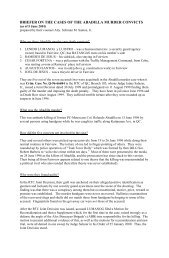Republic of the Philippines - Campaign
Republic of the Philippines - Campaign
Republic of the Philippines - Campaign
Create successful ePaper yourself
Turn your PDF publications into a flip-book with our unique Google optimized e-Paper software.
APPELLANTS’ BRIEF<br />
People <strong>of</strong> <strong>the</strong> <strong>Philippines</strong> vs. Fortuna, et. al.<br />
S. C. G. R. No. 141660-64<br />
<strong>the</strong>se cases demands that <strong>the</strong>y be settled promptly and definitely, brushing aside…<br />
technicalities <strong>of</strong> procedure.”<br />
The Echegaray cases, People vs. Echegaray (267 SCRA 682) [hereinafter,<br />
Echegaray I] and Echegaray vs. Executive Secretary (297 SCRA 754) [hereinafter<br />
Echegaray II], are not, and cannot be, <strong>the</strong> last word on <strong>the</strong> death penalty constitutionality<br />
issue. These are cases <strong>of</strong> mandatory death penalty, not discretionary death penalty like<br />
<strong>the</strong> case at bar. Echegaray I itself ruled (at pp. 722-23) that “As to o<strong>the</strong>r crimes in R.A.<br />
No. 7659 punished by reclusion perpetua to death [e.g. murder]… The proper time to<br />
determine <strong>the</strong>ir heinousness in contemplation <strong>of</strong> law, is when on automatic review, we<br />
are called to pass on a death sentence involving crimes punishable by reclusion perpetua<br />
to death under R.A. No. 7659, with <strong>the</strong> trial court meting out <strong>the</strong> death sentence in<br />
exercise <strong>of</strong> judicial discretion.” We submit that it is not only heinousness <strong>of</strong> <strong>the</strong> crime<br />
that is to be determined in such case but also <strong>the</strong> constitutionality <strong>of</strong> <strong>the</strong> punishment.<br />
But to quote fur<strong>the</strong>r <strong>the</strong> guidance from Echegaray I (at p. 723): “Thus, construing<br />
R.A. No. 7659 in pari materia with <strong>the</strong> Revised Penal Code, death may be imposed<br />
when: (1) aggravating circumstances attend <strong>the</strong> commission <strong>of</strong> <strong>the</strong> crime as to make<br />
operative <strong>the</strong> provision <strong>of</strong> <strong>the</strong> Revised Penal Code regarding <strong>the</strong> imposition <strong>of</strong> <strong>the</strong><br />
maximum penalty; and (2) o<strong>the</strong>r circumstances attend <strong>the</strong> commission <strong>of</strong> <strong>the</strong> crime which<br />
indubitably characterize <strong>the</strong> same as heinous in contemplation <strong>of</strong> R.A. No. 7659 that<br />
justify <strong>the</strong> imposition <strong>of</strong> death, albeit <strong>the</strong> imposable penalty is reclusion perpetua to<br />
death.” (underscoring supplied) The two sets <strong>of</strong> circumstances must concur.<br />
At this juncture, we have to seize <strong>the</strong> moment to point out that in <strong>the</strong> trial court’s<br />
appealed judgment <strong>of</strong> conviction imposing five death sentences <strong>the</strong>re is only discussion<br />
<strong>of</strong> <strong>the</strong> aggravating circumstances but no discussion, not even mention, <strong>of</strong> <strong>the</strong> key o<strong>the</strong>r<br />
circumstances like “heinousness” and “compelling reasons” that might justify <strong>the</strong><br />
imposition <strong>of</strong> <strong>the</strong> death penalty. On this score alone, <strong>the</strong>refore, <strong>the</strong> death penalty should<br />
Page 20 <strong>of</strong> 127<br />
20




